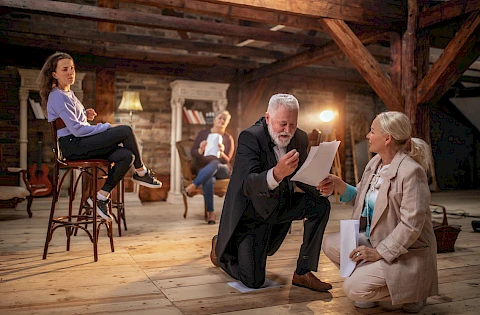
One engaging way older adults can stay connected is by joining theater groups. These settings bring together social interaction, creative activity, and shared experiences. One innovative and enjoyable way seniors can enhance their social lives is by joining theater groups. These groups offer a wonderful blend of social interaction, creativity, and personal growth. Explore multiple benefits of senior theater groups and get tips on finding or starting one in your area.
The Social Benefits of Senior Theater
Taking part in a theater group is more than just learning lines and putting on a show. It's about building relationships and a supportive community around a shared interest.
Senior theater groups provide a platform for forming new friendships. Regular rehearsals and performances lead to teamwork and camaraderie, strengthening bonds that extend beyond the stage. Participating in theater activities encourages more transparent communication. Seniors practice speaking confidently, which translates into improved everyday interactions. Especially for those living alone, joining a theater group offers a sense of belonging. It combats loneliness by providing a regular social outlet and support network.
The Creative and Personal Growth Advantages
Theater is about social interactions and also a means for personal development and creative exploration.
Stepping onto the stage, stepping into a character, and hearing applause can be an incredibly empowering experience. These experiences increase self-confidence and help seniors feel vital and capable. Theater provides a safe space to express oneself creatively through acting, writing, or even set design. This creative freedom contributes to a sense of accomplishment and joy.
Participating in theater activities involves memorization and quick thinking, which can improve memory and mental agility. This mental stimulation is a fun way to keep the brain active and engaged.
How to Find a Senior Theater Group
Finding a theater group that fits can seem complicated, but here are several ways to start your search:
- Local community and senior centers often host or know of existing performance groups. They are a good first step in connecting interested participants.
- Libraries and local arts organizations might hold information sessions or workshops for seniors interested in theater.
- Online resources and social media platforms can help you discover theater communities. Websites and Facebook groups dedicated to local theater events offer opportunities to connect.
Starting Your Own Senior Theater Group
If you don't find a group that fits your needs, consider starting your own. Here's how to get started:
- Gather interested participants. Spread the word among friends and at community spots. Flyers or notices in local newsletters might attract fellow theater enthusiasts.
- Focus on finding a suitable venue and securing the necessary resources. Look for spaces like community halls or rooms in local centers where the group can meet and rehearse. Sometimes, libraries or schools offer affordable rental spaces for performances.
- When planning and organizing performances, start with simple skits or readings and gradually work up to larger productions. Remember, the goal is to have fun and enjoy the creative process.
Creative Engagement With Lasting Benefits
Senior theater groups are a vibrant outlet for social engagement, creativity, and personal growth. They offer seniors a chance to meet new friends, explore their creative side, and stay mentally challenged. If you reside in St. Paul, Roseville, New Brighton, Shoreview, or North Oaks and need help with the care of your senior family member, don't hesitate to contact us at Senior Helpers Roseville. We would love to discuss our services for seniors and their caregivers, including Personal Care and Companion Care.